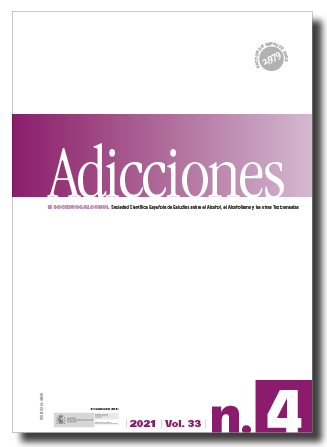Grupo de psicoterapia para pacientes con adicciones hospitalizados en tiempos de la COVID-19
DOI:
https://doi.org/10.20882/adicciones.1702Palabras clave:
Grupo de psicoterapia, COVID-19, adicciones, tratamiento hospitalario.Resumen
A medida que evoluciona la pandemia de la COVID-19, se ha vuelto cada vez más difícil encontrar un área relacionada con la salud que no se vea afectada por sus consecuencias, ya sea directa o indirectamente (Legido-Quigley et al., 2020). La psicoterapia grupal para pacientes hospitalizados no ha sido una excepción. Este informe describe el recorrido de nuestro grupo de pacientes con adicciones hospitalizados durante la pandemia.Citas
Amanullah, S. y Ramesh Shankar, R. (2020). The Impact of COVID-19 on physician burnout globally: A review. Healthcare, 8, 421. doi:10.3390/healthcare8040421.
Bandelow, B., Lueken, U., Wolff, J., Godemann, F., Wolff-Menzler, C., Deckert, J.,... Berger, M. (2016). Leitliniengerechte stationäre psychiatrisch-psychotherapeutische/psychosomatische behandlung von angsterkrankungen: Wieviel personal ist erforderlich? [Guideline-oriented inpatient psychiatric psychotherapeutic/psychosomatic treatment of anxiety disorders: How many personnel are need?]. Der Nervenarzt, 87, 302–310. doi:10.1007/s00115-016-0085-1.
Burlingame, G. M., Seebeck, J. D., Janis, R. A., Whitcomb, K. E., Barkowski, S., Rosendahl, J. y Strauss, B. (2016). Outcome differences between individual and group formats when identical and nonidentical treatments, patients, and doses are compared: A 25-year meta-analytic perspective. Psychotherapy, 53, 446–461. doi:10.1037/pst0000090.
Carbon, C. C. (2020). Wearing face masks strongly confuses counterparts in reading emotions. Frontiers in psychology, 11, 566886. doi:10.3389/fpsyg.2020.566886.
Emond, S. y Rasmussen, B. (2012). The status of psychiatric inpatient group therapy: Past, present, and future. Social Work with Groups, 35, 6891. doi:10.1080/01609513.2011.553711.
Gans, J. S. (1990). Broaching and exploring the question of combined group and individual therapy. International journal of group psychotherapy, 40, 123–137. doi:10.1080/00207284.1990.11490595.
Gans, J. S. y Counselman, E. F. (2010). Patient selection for psychodynamic group psychotherapy: Practical and dynamic considerations. International journal of group psychotherapy, 60, 197–220. doi:10.1521/ijgp.2010.60.2.197.
Hall, L. H., Johnson, J., Watt, I., Tsipa, A. y O’Connor, D. B. (2016). Healthcare staff wellbeing, burnout, and patient safety: A systematic review. PloS one, 11. doi:10.1371/journal.pone.0159015.
Kösters, M., Burlingame, G. M., Nachtigall, C. y Strauss, B. (2006). A meta-analytic review of the effectiveness of inpatient group psychotherapy. Group Dynamics, 10, 146-163. doi:10.1037/1089-2699.10.2.146.
Legido-Quigley, H., Mateos-García, J. T., Campos, V. R., Gea-Sánchez, M., Muntaner, C. y McKee, M. (2020). The resilience of the Spanish health system against the COVID-19 pandemic. The Lancet. Public health, 5, 251–252. doi:10.1016/S2468-2667(20)30060-8.
Li, L. (2020). Challenges and priorities in responding to COVID-19 in inpatient psychiatry. Psychiatric Services, 71, 624–626. doi:10.1176/appi.ps.202000166.
López-Pelayo, H., Aubin, H. J., Drummond, C., Dom, G., Pascual, F., Rehm, J.,… Gual, A. (2020). “The post-COVID era”: Challenges in the treatment of substance use disorder (SUD) after the pandemic. BMC medicine, 18, 241. doi:10.1186/s12916-020-01693-9.
Pfefferbaum, B. y North, C. S. (2020). Mental Health and the Covid-19 pandemic. New England Journal of Medicine, 383, 510–512. doi:10.1056/nejmp2008017.
Rubino, C., Luksyte, A., Perry, S. J. y Volpone, S. D. (2009). How do stressors lead to burnout? The mediating role of motivation. Journal of Occupational Health Psychology,
14, 289–304. doi:10.1037/a0015284.
Tucker, M. y Oei, T. P. S. (2007). Is group more cost effective than individual cognitive behaviour therapy? The evidence is not solid yet. Behavioural and Cognitive Psychotherapy, 35, 77–91. doi:10.1017/S1352465806003134.
Uscher-Pines, L., Sousa, J., Raja, P., Mehrotra, A., Barnett, M. L. y Huskamp, H. A. (2020). Suddenly becoming a “virtual doctor”: Experiences of psychiatrists transitioning to telemedicine during the COVID-19 pandemic. Psychiatric services, 71, 1143–1150. doi:10.1176/appi.ps.202000250.
van der Spek, N., Jansen, F., Holtmaat, K., Vos, J., Breitbart, W., van Uden-Kraan, C. F.,… Verdonck-de Leeuw, I. M. (2018). Cost-utility analysis of meaning-centered group psychotherapy for cancer survivors. Psycho-oncology, 27, 1772–1779. doi:10.1002/pon.4726.
Vigo, D. V., Kestel, D., Pendakur, K., Thornicroft, G. y Atun, R. (2019). Disease burden and government spending on mental, neurological, and substance use disorders, and self-harm: Cross-sectional, ecological study of health system response in the Americas. The Lancet. Public health, 4, 89–96. doi:10.1016/S2468-2667(18)30203-2.
Volkow, N. D. (2020). Stigma and the toll of addiction. New England Journal of Medicine, 382, 1289–1290. doi:10.1056/nejmp1917360.
Yalom, I. D. (1983). Inpatient Group Psychotherapy. Basic Books.








